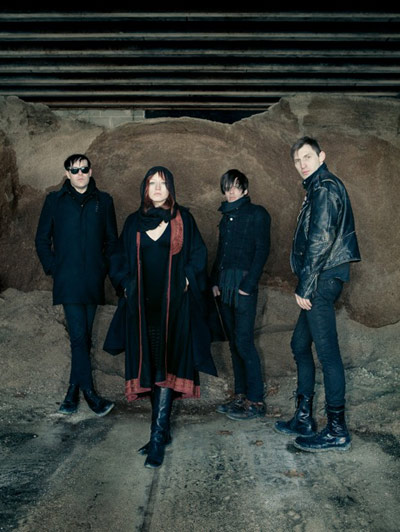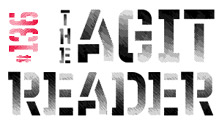
Spiritwalkers
by Kevin J. Elliott
It used to require blood, sweat and tears to be in a band. There was a point when it wasn’t so easy to tour on a whim, record big sounding records in the comforts of one’s bedroom, or produce a heightened sense of excitement on a stage that was then reciprocated by the audience. Without coming across as a jaded, nostalgic curmudgeon, let me just say these are different times, and it’s difficult to gather much interest for modern music when much of it isn’t all that intriguing and is usually devoid of empowering emotion. That’s something Sean Ragon knows all too well. While spending his formative years stridently following a punk ethos, his second awakening in Cult of Youth sounds like a call to arms that harkens back to the time when being in a band required an actual work ethic. But Cult of Youth’s latest self-titled album, their first for Sacred Bones, isn’t as much reactive to the current state of lethargic indie rock as it is a life’s project aimed to express primal energies and show how that energy can be manifested in labyrinthine avenues uncharted by traditional punk motifs.
Cult of Youth is nothing if it is not of a punk spirit. Ragon is experimenting with the gothic folk of Comus, the shanty of seafaring pariahs and desert nomads, and the post-apocalyptic raga of European post-punk bands like Current 93, who stripped punk down to a bleak core and came back in tribal colors raging against the machine. Cult of Youth started as Ragon’s bedroom redemption, with tapes and limitedly pressed vinyl filled with acoustic confessionals that dealt with themes ranging from the occult to pre-Christian paganism. Unless you’ve always been familiar with the aforementioned bands, then Cult of Youth’s Teutonic folk–punk might be entirely foreign. By recruiting members Micki Pellerano on bass, Christiana Key on violin and Glen Maryanski on drums, Ragon was able to fully realize the mission of Cult of Youth, arranging sweeping strings and complex rhythms to flesh out his once barren, but invigorating, songs. In speaking with Ragon on the day leading up to Cult of Youth’s New York release show, I found him to be a man of many words. First and foremost, it’s essential to understand that though Cult of Youth may sound like they’re coming from a very dark, desolate landscape, the music and message of Ragon and his band is one of positive vibes and an uplifting hope that begins to surface soon after the extrinsic nature of their sound settles in.
Cult of Youth is often described as punk, and while there’s definitely a punk spirit raging through the album, most people wouldn’t call it punk per se. Before this, did you play in more traditional punk bands, and if so, how did that translate over to what you are doing in Cult of Youth?
Sean Ragon: My background throughout the ’90s was playing in a lot of different punk bands, and I think Cult of Youth is definitely in the spirit of the first wave of punk and the spirit of the first wave of post-punk as well. But I’ve been pretty disillusioned with the whole idea of punk for about 10 years now. It was becoming more and more about re-creating the past. Punk, despite the politics being seen as very leftist, was actually quite conservative in the sense that it was a reaction to progressive music and a reaction against psychedelia and a return to more stripped-down rock & roll, which is in essence conservative. I had a hard time dealing with these people who in theory would say they were very liberal, but in practice were actually very close-minded and conservative. I had to really step away from it. At the end of the day, I still think I relate more with punk. This generation either grew up playing punk or playing indie rock and there’s a big chasm between those two groups. Like it or not, it’s my background.
There’s something almost exaggerated about the songs on this album that I can’t put my finger on, almost as if the high drama in your voice and the dynamics of the band is off-putting and over-the-top on first listen. Maybe it’s because not a lot of bands are doing what you do. Are you comfortable with people not getting it right off the bat? Do you consider Cult of Youth an acquired taste?
SR: No, I don’t think so. I think it’s more about putting a lot on the table. I think it’s a shame, to be honest. There’s just so much shallow and meaningless music out there that it’s almost offensive to me. If you look at the early days of punk, the reason that the quality control was so high was because you had to work to be in a band. There weren’t any networks and you couldn’t book a tour with emails. You really had to live it, and for that reason, people in bands were really dedicated to being in a band. Now there are so many hobbyist bands because it’s all so easy. The problem with having shit bands out there just makes it harder for everyone else. It’s bad for the world really.
I feel like a lot of the records put out by Sacred Bones and Dais comes from a pretty dark place. What is it in your past and present that attracts you to that mood when you are writing and arranging songs for Cult of Youth?
SR: I don’t think my music is dark at all. Actually, the direction my music is headed is really uplifting, really positive and with a serious message. I think we just get tagged with that because people don’t know what to call it. I do have a past of being into a lot of bad shit. I was a drug addict and an alcoholic and was very depressed. What came with getting sober was also becoming much more serious about the band. When you finally realize that what you are doing is touching people and reaching people who feel an emotional response, you all of a sudden realize you contribute to the world and you are contributing to peoples’ lives. I don’t think anyone would want to project from a dark and negative place. I’ve moved past that darkness and I want to contribute good, especially now with all of this witch-house fashion and all of these shitty black metal bands—people trying to be as evil as they can. That’s just silly to me. It’s like a porcupine. You want to put all of this negative shit forward because deep down you are afraid that people are going to hurt you. It’s all an act; they’re all frightened children.
I know originally you were doing Cult of Youth by yourself. Did you always have the idea of what Cult of Youth has become in the back of your mind while writing those earlier songs? For instance, when you wrote “Weary,” did you always hear the strings as part of the end result?
SR: Well, that song was written with the band, so yeah, that’s how I wanted it to sound. But on the Dais record and before that, I was just writing songs in my bedroom. I never really thought that anyone would hear it or care about it. I didn’t anticipate it to ever be a live project and I didn’t anticipate anyone ever wanting to interview me. That was fine with me.
I keep reading about how the Wicker Man soundtrack was a direct source of inspiration for you. Can you elaborate about what it is about Paul Giovanni’s music that intrigued you?
SR: I think that largely it’s just a reference point for people. I’ve always been interested in traditional pre-Christian religions and paganism. A lot of things that interest me are not really of the pop culture realm, so that’s something that people can gravitate to if they want to know where I’m coming from. When someone wants to know what I’m in to, I can point them to that and eventually they’ll say, “Oh, I get it.” I didn’t even see that movie until I was in my twenties, but ever since I was 12 years old I developed an interest in studying runes and reading about the occult. I guess I always felt more of an emotional connection with that than Christianity. But I don’t want to go off on a tangent now.
It looks like your label Blind Prophet is host to some pretty interesting bands, just in names and descriptions alone. What should one expect when buying one of your records? Is there a certain sound or aesthetic you are looking for when recruiting bands for the label?
SR: I’ve only got five releases so far, but I think each one is pretty strong. I just got back from driving around with two of the bands, Mueran Humanos from Argentina and You, who are originally from Detroit, but live in Brooklyn now. It was a really special thing on the road, all traveling together. Those two bands are very different, but I found something similar in them. They were both very earnest and true. Mueran Humanos sing in Spanish and are very sexy in their singing, even though they now reflect the music that they have learned about living in Berlin. And then you have You, who are very electro, but also very punk and totally against the audience. They really fit very well together.
You sound like someone who’s is extremely headstrong about where you want to go and how you want your records to sound, so I’m interested to know already what direction you want to take Cult of Youth and the sound of the next record.
SR: I’ve been writing it. To be honest, I’ve been really influenced by a lot of jazz artists and jazz singers. It may not seem like such an obvious influence, but I grew up listening to and playing a lot of piano. I want to touch on that influence a little more and pay tribute to those singers. I think I’m getting better as a vocalist. Who knows? You make one kind of record and it comes out another way. In my mind right now I’d like to make something more mature and more subtle and breezier and a lot less Teutonic and bombastic. You spend a few months touring, leaving with a bunch of ideas, and you come back with a completely different idea.
